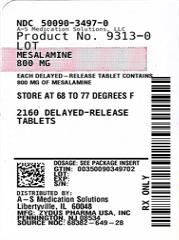Mesalamine Tablet, Delayed Release while Breastfeeding

What is Mesalamine Tablet, Delayed Release used for?
Mesalamine Tablet, Delayed Release while breastfeeding safe or not? Can there be any side effects for infant while using it during breastfeeding?

8.2 Lactation Risk Summary Mesalamine and its N-acetyl metabolite are present in human milk in undetectable to small amounts [see Data]. There are limited reports of diarrhea in breastfed infants. There is no information on the effects of the drug on milk production. The developmental and health benefits of breastfeeding should be considered along with the mother's clinical need for Mesalamine delayed-release tablets and any potential adverse effects on the breastfed infant from the drug or from the underlying maternal condition. Clinical Considerations Monitor breastfed infants for diarrhea. Data Human Data In published lactation studies, maternal mesalamine doses from various oral and rectal formulations and products ranged from 500 mg to 3 g daily. The concentration of mesalamine in milk ranged from non-detectable to 0.11 mg/L. The concentration of the N-acetyl-5-aminosalicylic acid metabolite ranged from 5 to 18.1 mg/L. Based on these concentrations, estimated infant daily dosages for an exclusively breastfed infant are 0 to 0.017 mg/kg/day of mesalamine and 0.75 to 2.72 mg/kg/day of N-acetyl-5-aminosalicylic acid.
Mesalamine Tablet, Delayed Release Breastfeeding Analsys
Mesalamine while Breastfeeding
SafeCAS Number: 89-57-6
Mesalazine is badly absorbed by the intestine, serum levels are low with scant excretion into breast milk. N-acetyl-5-ASA is an inactive metabolite which is excreted into breast milk but not higher than 10% of relative infant's dose. No harm effects among breastfed infants from treated mothers have been reported, except for rare cases of diarrhea reported in the 80's with the use of Mesalazine compounds different to Balsalazide. In a review of 121 cases and 121 controls, the authors failed to observe those findings. (Moretti, 1989). Expert consensus supports the compatibility of Mesalazine during breastfeeding.
Mesalamine Tablet, Delayed Release Breastfeeding Analsys - 2
Mesalamine while Breastfeeding
CAS Number: 89-57-6
Mesalamine is poorly excreted into breastmilk. However, rather high levels of the mesalamine metabolite N-acetyl-5-ASA appear in breastmilk and its effects on breastfed infants are unknown. A few cases of diarrhea have been reported in infants exposed to mesalamine, although the rate is not high. Most experts consider mesalamine derivatives to be safe during breastfeeding.[1][2][3][4] If mesalamine is required by the mother, it is not a reason to discontinue breastfeeding, but carefully observe breastfed infants for diarrhea during maternal use of mesalamine.
I am nursing mother and I have already used Mesalamine Tablet, Delayed Release, what should I do?
It is always a good idea to keep your healthcare provider or doctor informed about your drug usage during pregnancy and breastfeeding but if you have not informed your doctor about Mesalamine Tablet, Delayed Release and have used it then do not panic as Mesalamine Tablet, Delayed Release is mostly safe in breastfeeding and should not cause any harm to your baby.
I am nursing mother and my doctor has suggested me to use Mesalamine Tablet, Delayed Release, is it safe?
Usage of Mesalamine Tablet, Delayed Release is safe for nursing mothers and baby, No worries.
If I am using Mesalamine Tablet, Delayed Release, will my baby need extra monitoring?
No
Who can I talk to if I have questions about usage of Mesalamine Tablet, Delayed Release in breastfeeding?
US
National Womens Health and Breastfeeding Helpline: 800-994-9662 (TDD 888-220-5446) 9 a.m. and 6 p.m. ET, Monday through Friday
UK
National Breastfeeding Helpline: 0300-100-0212 9.30am to 9.30pm, daily
Association of Breastfeeding Mothers: 0300-330-5453
La Leche League: 0345-120-2918
The Breastfeeding Network supporter line in Bengali and Sylheti: 0300-456-2421
National Childbirth Trust (NCT): 0300-330-0700
Australia
National Breastfeeding Helpline: 1800-686-268 24 hours a day, 7 days a week
Canada
Telehealth Ontario for breastfeeding: 1-866-797-0000 24 hours a day, 7 days a week
